“My dad was never one to scream and shout at me,” says Jason Tindall, the Bournemouth manager as his father, Jimmy, and I listen to him on our split Zoom screens. “Yes, he would always tell me if I didn’t play well. Just like I do with my son. But I don’t remember ever going into a game where I was worried what my dad might say. I think that happens to a lot of kids now and it harms their development. It was different with my dad. He just let me play football.”
Jason and Jimmy are at home on a Sunday afternoon in Bournemouth as they discuss a remarkable family footballing story that spans three generations. Sixty years have just passed since Jimmy, now 75, formed Senrab FC in the East End of London. Senrab have produced more elite-level footballers and coaches than any other grassroots club in the country with their list of former players including Ray Wilkins, Alan Curbishley, Ray Lewington, John Terry, Sol Campbell, Ledley King, Lee Bowyer, Ugo Ehiogu, Bobby Zamora and Jermain Defoe.
Jason Tindall showed so much promise at Senrab that he played a year above his age in a dominant midfield partnership with Bowyer. His pride in his dad setting up Senrab is obvious, but he believes his father’s greatest work was done over 22 years at West Ham’s academy where Jimmy discovered and developed so many outstanding young players including Joe Cole and Michael Carrick.
Jimmy and Jason love talking about their family’s gritty old days in Mile End and Stepney, and the great players and games that lit up their time at Senrab on the Wanstead Flats, but their lives have changed. Jimmy is a retired grandfather and he and his wife moved from east London to be close to Jason’s family in Bournemouth. His daughter, Evin, also left the West Ham academy to work at Bournemouth’s – where Jason’s 10-year-old son, Levi, has emerged as a prodigious talent.
Levi’s grandfather and father are both pragmatic and they stress how far the youngster has to go before he fulfils his considerable potential. But there is more than pride in Jimmy’s voice when he talks about Levi: “I know he’s my grandson, but I say it as I see it. He’s a very, very good player. He’s as good as any of the kids I’ve seen come through and make a living in the game. I just worry about one thing – I hope he wants it as much as his dad wanted it.”
Quick Guide
Jimmy Tindall on the Senrab way and star players
“The main thing at Senrab was that we encouraged them to play and enjoy it. Pass the ball, push and run. I wanted them to play with a smile so I told every Senrab coach to talk to the parents. Tell them to encourage the boys but don’t dare shout and scream while they’re playing. If you do that, we don’t want you here.
“We always had good players. The late Ray Wilkins, Butch Wilkins, was a Senrab player and he played in the same team as Ray Lewington who is now the assistant manager of Crystal Palace. Ray was well above-average and I could see he was a good player. But I wouldn’t say he was outstanding. The most outstanding player I ever saw was Joe Cole. He had more tricks than dDynamo on the pitch. Joe was a one-off. But Ray was a very intelligent player and he looked like a pro even as a kid. It was the same with Frank Lampard at West Ham. When Frank was 10 you could see he knew the programme inside out.”
That professional overview, forged over so many years, melts into a personal lament that sounds like an echo of grief during this distressing pandemic. “It breaks my heart that I can’t watch Levi play because of this Covid,” Jimmy says with raw emotion. “For a long time now I’ve not been allowed to see him play. I don’t even want to know how they got on. I get the hump when they say: ‘Levi’s done well again. He’s done this or that.’ I don’t want to know because it’s driving me mad.”
Junior academy football has ground to a halt again. In the Championship, where Bournemouth remain in the play-off places despite a recent dip, fans remain locked out of the grounds they love. Jason looks across at his father who, usually, would follow Bournemouth to every game, home and away. “You’ve made it to two games these last 10 months,” Jason says to Jimmy. “That was when things were a bit better but then the lockdown started again.”
Jimmy looks shattered, briefly, but it is easy to lift his spirits. As reluctant as he is to claim credit for the revolution he helped start 60 years ago, as east London established itself as a hotbed for gifted footballers, there is a sparkle about Jimmy as he remembers setting up Senrab.
“A couple of my older mates left school and said: ‘Make sure you keep an eye on our younger brothers,’” he recalls. “There were about six of them and they’d started playing football. But we didn’t have a school team for them so I said to the teacher: ‘You’ve already got an older team so can I start one for these younger boys?’ From running that school side it went on. The boys said: ‘Can we keep together and play Sunday football?’ That’s how Senrab started. I was only 15.
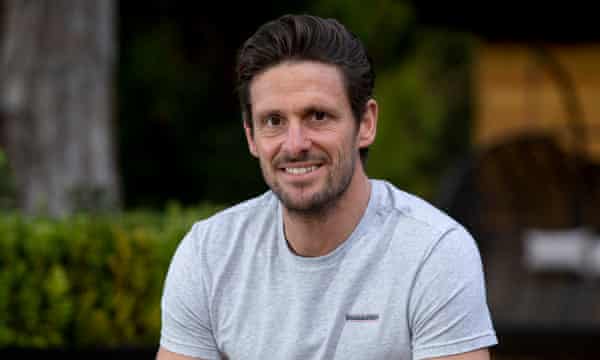
“We played in Wanstead Flats but we trained at a school called Marion Richardson in Stepney. The school is in Senrab Street. I had left school and worked down the meat market and a guy called Johnny Newport ran a Boys’ Brigade down in Essex. He offered us a game and we went and played them and won 23-0. Afterwards their chairman said: ‘When I look at these players I can understand why there are great London teams like West Ham and Arsenal. But I don’t even know the name of this team.’ Our captain was Terry Shepherd – I used to sit next to his sister at school. Terry said: ‘We’re called Senrab. Senrab United, because we’re all united.’ That’s how we got the name – and if you spell Senrab backwards it’s Barnes.”
Senrab began to dominate Sunday league football in east London. They were so successful that, as Jimmy says: “Every week there were more scouts than parents watching.”
Jason stresses how much Senrab helped him and other young footballers. “You’re being brought up around trouble but football kept me away from it. Kids I knew were getting into trouble with the police, and some were gang fighters, but they respected us footballers. They knew we had to stay clean and they left us alone. But all my resilience comes from my family and background. You’d have a setback but you get up. You never give up.”
Tindall needed such resilience. Playing for Arsenal’s youth teams he developed knee problems which then plagued his professional career as he underwent 12 operations. He lost the speed which had made him such a shimmering talent and he moved from being a free-scoring forward to the midfield and finally to central defence where he played most of his 199 games for Bournemouth.
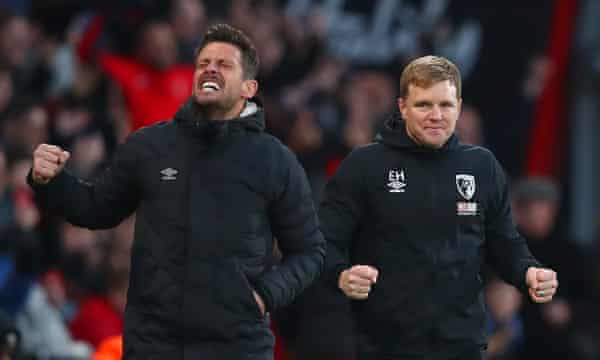
After a brief spell as manager of Weymouth, Tindall became Eddie Howe’s assistant at Bournemouth in 2008. They were former teammates who became, for the next 12 years, a successful managerial duo – with their long tenure at Bournemouth broken only by an 18-month spell at Burnley in 2011-12. In assessing his partnership with Howe, the 43-year-old Tindall explains that: “I’m only two weeks older than Eddie. We had played at centre-back together but were different characters even then. We got on but weren’t close off the pitch. But we both have got our opinion which we voice. I think that helped us.”
At the age of 31, Howe and Tindall helped Bournemouth avoid relegation to the Conference after they took charge in January 2009. They then helped the club win three promotions in six years and, in 2015, Bournemouth finally went up to the top flight for the first time in their history. What was their secret? “Team spirit, our sense of togetherness and the hunger of the players. In making it to the Premier League we achieved something we had never thought possible. But we managed to make the players hungry and motivated to get there.”
Bournemouth spent the next five seasons in the Premier League and “the biggest lesson was how difficult it is. Sam Allardyce said to us, when he was at West Ham: ‘You’ve got to respect the point in the Premier League.’ Sometimes don’t chase three points because you can play well for 89 minutes but the quality of the opposition means if you make one mistake it will be punished.”
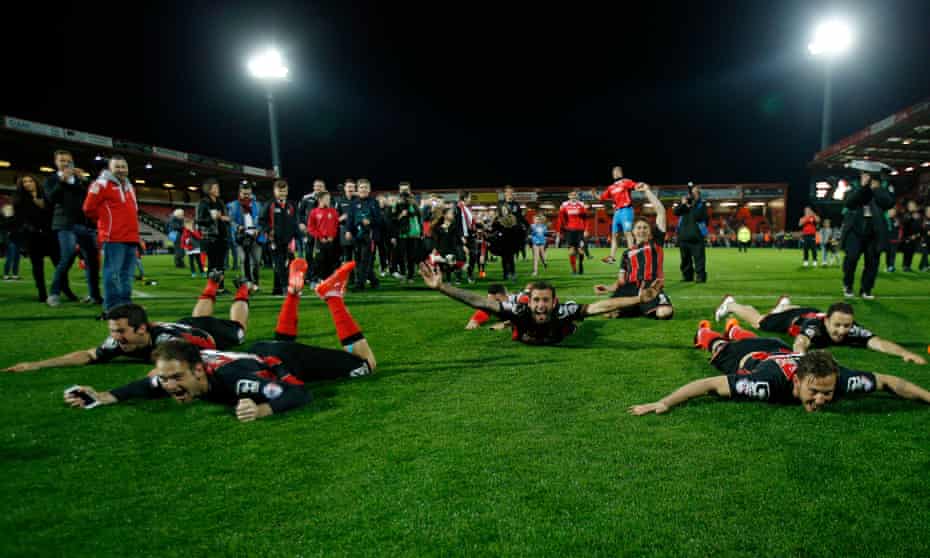
After Howe’s departure last August, following relegation, Tindall was asked to become manager. Having not considered the possibility before, Tindall says it was an initially difficult decision but “I’ve had over 500-odd games as assistant manager, three promotions, five years in the Premier League. It felt like the time to take the opportunity especially as there was no guarantee of whether we [he and Howe] would be back in management in six months.”
Bournemouth were top of the Championship last month but they have slipped to sixth after a patchy run. “I’m frustrated,” Tindall says, “but I judge it where we have come from – as a club that got relegated unexpectedly and lost 10 Premier League players and only signed two. Callum Wilson and Nathan Aké were two of our biggest players over the last five seasons and they are not easy to replace. The main thing for me was to take a team that’s been used to losing [last season], and doesn’t want to be in the Championship, and get everybody fighting for the same cause. So I think we have to be pleased with where we are. We have got players coming back and I think we’ve got every chance of going up.”
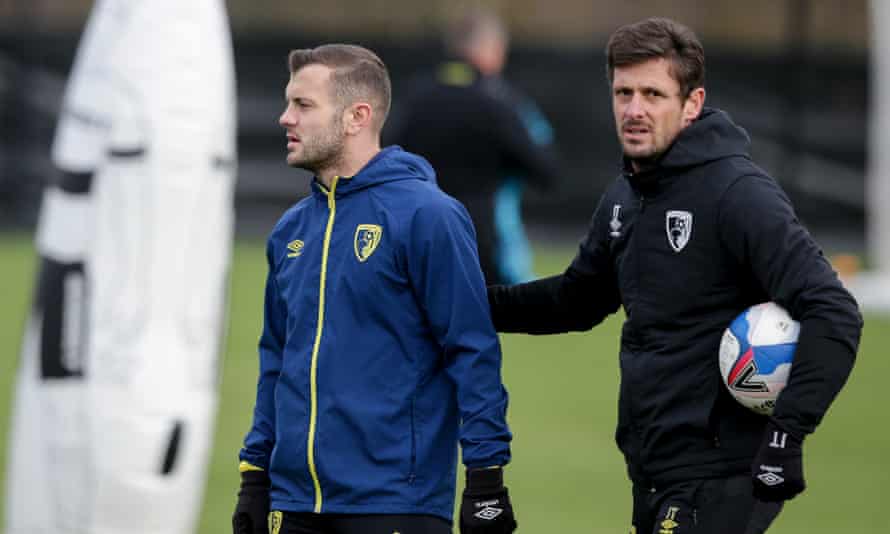
His new job is consuming but Tindall remains fully engaged in family life. “There is always a hard balance to find as a parent,” he says, “because you want to give them some of the nice things you didn’t have as a kid. At the same time, you want them to grow up with the right foundations, the right morals, to become a good person. That’s the number one priority.
“When I was at Senrab we could dedicate ourselves to training because there were no distractions with mobile phones or the latest PlayStation. So instead of playing that for four hours we’d be outside playing football for four hours. My biggest worry now, not only for my son but for very talented kids, is dedicating enough time to football. Sometimes I have to get Levi off his game console but most of the time he does that himself. Fortunately we’ve got a big enough garden for him to go out and play football. From what I’ve seen of his age group across the country, when they play teams like Arsenal and the so-called best kids, he’s got the talent. So if he has the right attitude I’ve got no doubt that he’ll make it.”
When he joins us Levi sits next to his dad and smiles shyly as he tells me that he plays right wing or “just behind the striker”.
The goals are flowing as his father points out: “I think he’s got 32 goals in eight games this season.”
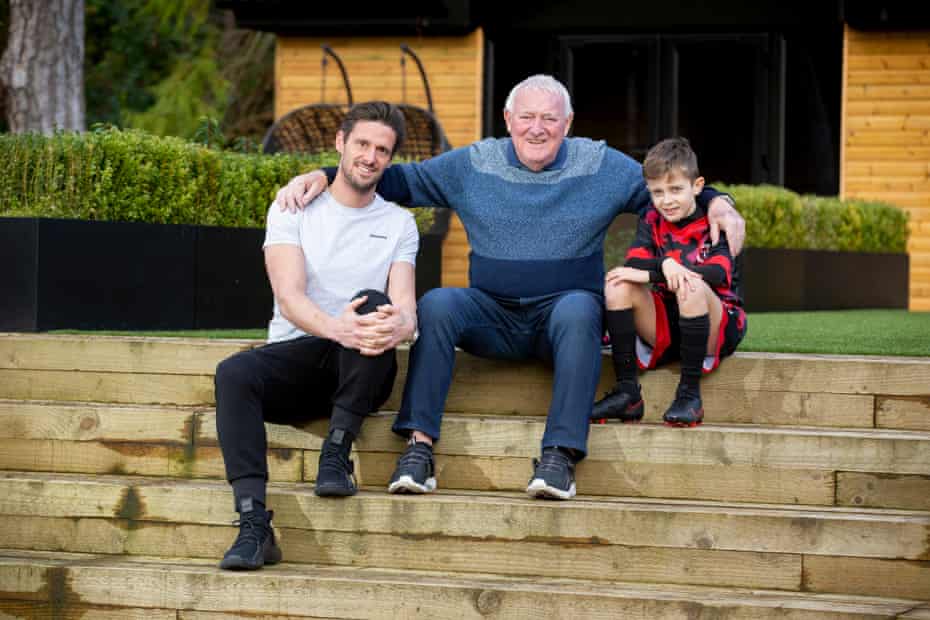
How is his dad doing when they play in the garden? “He’s scored some good goals,” Levi says with a grin.
His dad laughs. “He was a bit surprised by the volley I scored against Wrexham,” Tindall says as he remembers one for his rare goals for Bournemouth.
“It was banging!” Levi exclaims.
Levi’s favourite player is Kylian Mbappé “because of his skills and pace” and he pauses when I ask how would feel if, one day, he could play in a team managed by his dad? “I’d feel good.”
“Would you want me to be your manager?” his dad asks.
“It would be a bit of both,” Levi says.
Sign up to The Recap, our weekly email of editors’ picks.
Jimmy has been on mute but he has been beaming while listening to us. Is Levi aware of all the great work his grandad did at Senrab and West Ham? “I know he signed Jermain Defoe, Michael Carrick, Glen Johnson and lots of players.”
When I am alone with his father and grandfather again, Jimmy, the great old man of Senrab, leans forward. “If Levi makes it I can die a happy man. I’ll be so pleased, so proud. He’s got a little way to go but, if he wants to be a footballer as much as his dad wanted it, then he won’t go wrong.”
from Football | The Guardian https://ift.tt/3iRqZvO
via IFTTT

No Comment